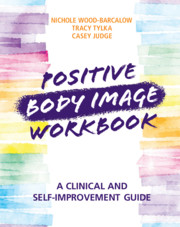Book contents
- Positive Body Image Workbook
- Positive Body Image Workbook
- Copyright page
- Contents
- Foreword
- Acknowledgments
- Section I Introduction and Preparation
- Section II The Journey Toward Positive Body Image
- Chapter 4 Appearance Ideals and Media Literacy
- Chapter 5 Weight Stigma versus Weight Inclusivity
- Chapter 6 Body Acceptance by Others
- Chapter 7 Defining Beauty and Cultural Pride
- Chapter 8 Self-Compassion and Body Image Flexibility
- Chapter 9 Approaching Our Bodies
- Chapter 10 Body Appreciation
- Chapter 11 Functionality Appreciation
- Chapter 12 Embodiment
- Chapter 13 Objectification and Self-Objectification
- Chapter 14 Sexual Intimacy
- Chapter 15 Social Comparison
- Chapter 16 Body Talk
- Chapter 17 Protective Filtering
- Chapter 18 Rippling Effect: Mentorship
- Chapter 19 Self-Care
- Chapter 20 Fueling Our Bodies
- Chapter 21 Life-Enhancing Movement
- Chapter 22 Adaptive Appearance Investment and Quality of Life
- Section III Continuing Our Journeys
- Index
- References
Chapter 17 - Protective Filtering
from Section II - The Journey Toward Positive Body Image
Published online by Cambridge University Press: 02 February 2021
- Positive Body Image Workbook
- Positive Body Image Workbook
- Copyright page
- Contents
- Foreword
- Acknowledgments
- Section I Introduction and Preparation
- Section II The Journey Toward Positive Body Image
- Chapter 4 Appearance Ideals and Media Literacy
- Chapter 5 Weight Stigma versus Weight Inclusivity
- Chapter 6 Body Acceptance by Others
- Chapter 7 Defining Beauty and Cultural Pride
- Chapter 8 Self-Compassion and Body Image Flexibility
- Chapter 9 Approaching Our Bodies
- Chapter 10 Body Appreciation
- Chapter 11 Functionality Appreciation
- Chapter 12 Embodiment
- Chapter 13 Objectification and Self-Objectification
- Chapter 14 Sexual Intimacy
- Chapter 15 Social Comparison
- Chapter 16 Body Talk
- Chapter 17 Protective Filtering
- Chapter 18 Rippling Effect: Mentorship
- Chapter 19 Self-Care
- Chapter 20 Fueling Our Bodies
- Chapter 21 Life-Enhancing Movement
- Chapter 22 Adaptive Appearance Investment and Quality of Life
- Section III Continuing Our Journeys
- Index
- References
Summary
Our immune systems help protect our bodies from illnesses caused by potentially damaging viruses, bacteria, and cancer-causing agents. We don’t have to ask our immune systems to keep us well, they just do their job, nearly all of the time. However, our immune systems are not foolproof. Sometimes illnesses are too strong, or our immune systems are compromised (e.g., from stress, lack of sleep, immunosuppressive medication), and we get sick. With rest, self-care, and perhaps medication, our bodies recover.
- Type
- Chapter
- Information
- Positive Body Image WorkbookA Clinical and Self-Improvement Guide, pp. 249 - 266Publisher: Cambridge University PressPrint publication year: 2021



